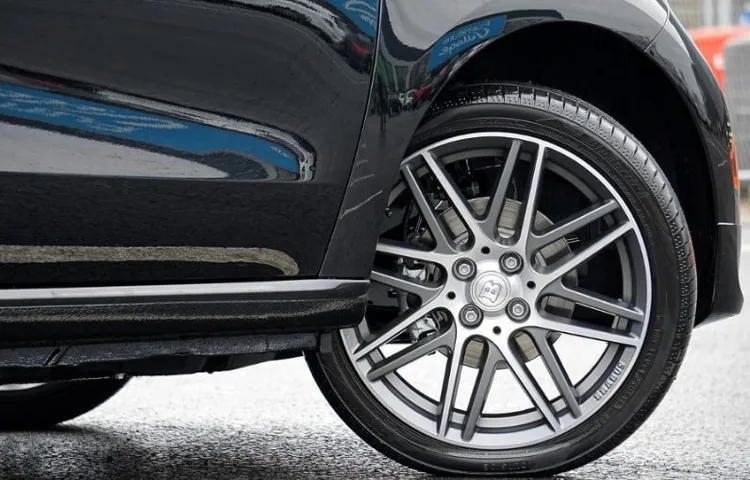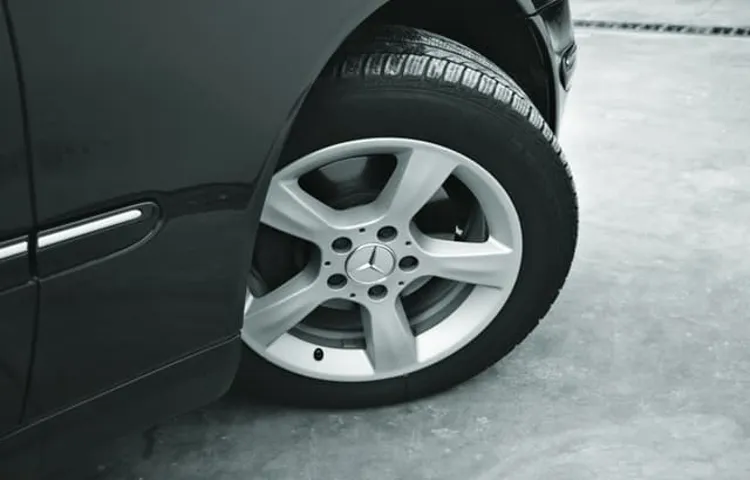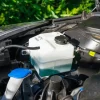Are you tired of hearing that screeching noise every time you turn your car? You’re not alone. Many people experience this common issue with their tires, and it can be both annoying and unsettling. But why do your tires screech when turning, and what can you do about it? In this blog post, we will explore the causes of this problem and provide some helpful tips to prevent your tires from screeching and maintain a safe driving experience.
So, buckle up, and let’s get to the root of this squeaky situation.
Table of Contents
Common Causes
If you’ve ever experienced a tire screech when turning, you know just how jarring it can be. Not only is it incredibly loud and startling, it can also be an indication that something isn’t quite right with your car. There are a few different reasons why you might be hearing that screeching sound.
One common cause is low tire pressure. When your tires don’t have enough air, they can become misshapen and start to wear down in uneven ways. This can result in screeching noises when you turn.
Another possible cause is worn-out brake pads. When your brake pads become too thin, they can start to make contact with your rotors and produce a high-pitched squealing sound. Finally, a loose or worn-out belt can also cause screeching noises, particularly when you turn.
If you’re experiencing tire screeching, it’s best to get your car checked out by a professional to identify and fix the issue before it becomes more serious.
Worn-out Tires
Worn-out tires are a common issue that every driver encounters at some point. It could be due to various reasons such as hard braking, sharp turns, over-inflation, under-inflation, and neglecting regular tire maintenance. Hard braking and sharp turns put extra pressure on the tires, leading to wear and tear.
Over or under-inflation affects the tire’s stability, leading to uneven treadwear. Similarly, neglecting regular tire maintenance can result in debris accumulating in the tires, causing them to wear out prematurely. It is crucial to maintain tires regularly, including rotating them and keeping them at the right pressure level.
Driving on worn-out tires can be hazardous, leading to blowouts, poor vehicle handling, and decreased fuel efficiency. In short, taking care of tires is not only essential but can also save money in the long run.

Low tire pressure
Low tire pressure can cause a variety of problems for drivers out on the road. Some common causes of this issue include changes in temperature, punctures or leaks in the tire, and simply not checking the pressure regularly. When temperature drops, the air inside the tire becomes more dense, leading to lower pressure.
On the other hand, hot weather can cause the air inside the tire to expand, leading to overinflation if the pressure is not checked. Punctures or leaks in the tire can also cause pressure to drop rapidly. It’s important to check your tire pressure regularly to ensure that it remains at a safe level.
This can be done easily with a simple tire gauge. If you notice that your tires are low on pressure, it’s important to fill them up as soon as possible to prevent further damage to your tires and ensure your safety on the road.
Faulty Wheel alignment
If you’re experiencing steering problems or a bumpy ride, there’s a good chance your wheel alignment is off. There are several common causes of faulty wheel alignment that can lead to these issues. Firstly, hitting a curb or pothole can cause misalignment, as it can knock your wheels out of place.
Another common reason for misalignment is worn out or damaged suspension components, which can affect the angles of your wheels. Additionally, age and wear and tear can cause your vehicle’s alignment to shift over time. It is important to have your wheels checked regularly and have any issues addressed quickly to prevent further damage to your vehicle.
Neglecting your vehicle’s alignment can also result in uneven tire wear, which can lead to the need for costly tire replacements. Remember, regular maintenance of your vehicle can keep it running smoothly for years to come.
Impact of Tire Screeching
Tire screeching can be alarming and irritating, especially when taking a turn. It denotes that your tires are not gripping the road surface as they should and could potentially lead to an accident when driving at speed. An essential factor that determines your tires’ ability to grip the road surface is their rubber compound’s age.
The older the tire, the stiffer and less grippy it becomes, which could lead to a loss of traction. Harsh braking, hard acceleration, and sharp turns could also cause tire screeching. It’s essential to maintain your vehicle regularly, inspecting the tires and rotating them as recommended.
Also, drive at a moderate speed, mainly when taking turns, to prevent tire screeching and improve your vehicle’s overall safety.
Decreased Traction
When tires screech, it’s never a good sign. It’s a clear indication of decreased traction, and it can cause serious problems on the road. Reduced traction means that your tires aren’t gripping the road as well as they should, which can lead to loss of control, especially during turns.
If you’re driving in wet or slippery conditions, this problem can be even more pronounced. In such situations, it is advisable to slow down and drive carefully. Tires screeching could also mean that your vehicle is producing more friction and heat than normal.
This excess heat can cause your tires to wear out more rapidly and even blow out, resulting in expensive repairs. All in all, it’s best to address decreased traction as soon as you can. This can be done by getting your tires checked and replaced as needed to ensure optimal traction and avoid road accidents.
Always prioritize safety on the road.
Uneven Tread Wear
Uneven tread wear on tires is a common issue that can be caused by a multitude of things, but one factor that people often overlook is the impact of tire screeching. When you hear that high-pitched sound, it might seem like an insignificant nuisance, but it can actually be doing serious damage to your tires. Tire screeching occurs when the tire loses traction with the road surface, causing it to rapidly rotate and create friction.
This excess friction can wear down the surface of the tire prematurely, resulting in uneven tread wear and a shorter lifespan for your tires. It’s important to address the root cause of tire screeching, whether it be aggressive driving, poor road conditions, or worn-down brakes, in order to protect your tires and ensure they have a long and healthy lifespan on the road. By being mindful of the impact of tire screeching on your tires, you can help prevent uneven tread wear and keep your vehicle running smoothly.
Increased Braking Distance
One of the most significant consequences of tire screeching while braking is the increased braking distance. When you hear the tires screech, it typically means that the wheels have locked up, and the car is skidding on the pavement. This skid reduces the friction between the tires and the road, decreasing the car’s ability to stop quickly.
As a result, the braking distance increases, and the driver needs more time and space to bring the vehicle to a complete stop. This can be particularly problematic in emergency situations, where every second counts. If you hear your tires screeching, it’s important to ease off the brake pedal slightly until the wheels start turning again, allowing you to regain control and reduce the stopping distance.
So, always be attentive to your car’s reaction when you brake and avoid overconfidence in your vehicle’s response.
How to Fix Tire Screeching When Turning
Are you experiencing that annoying screeching sound when turning your vehicle? This could be caused by a few different things, but the most common culprit is worn-out brake pads. When the pads wear down, they can produce a high-pitched noise as they come into contact with the rotor. Another cause could be low-quality or uneven tires, which can cause the wheels to slip and lose traction when turning.
To fix the issue, you should first inspect your brake pads to see if they need to be replaced. Additionally, you may want to consider getting new, high-quality tires that can provide better grip and reduce the risk of slipping. Remember, safety should always be your top priority when driving, so don’t hesitate to replace worn-out parts and seek professional help if needed.
Inspect Your Tires Properly
Tire screeching is one of the most unsettling sounds you can hear while driving. Not only is it an annoyance, but it can also be a warning sign that something is wrong with your car. If you hear tire screeching when turning, it’s time to inspect your tires.
First, check the pressure in your tires, as improper inflation can cause screeching. Additionally, inspect the treads for any unusual wear or damage. If you notice any issues, it’s best to replace the tire as soon as possible for your safety.
Remember to also check your alignment, as misaligned wheels can cause tire screeching. Overall, properly inspecting your tires can prevent accidents and keep you safe on the road.
Get Appropriate Wheel Alignment and Balancing
Tire screeching when turning can be frustrating and concerning. Luckily, there are a few possible solutions to this problem. Firstly, ensure that your car’s wheel alignment and balancing are appropriate.
Misaligned wheels can cause uneven tire wear, leading to screeching and other issues. Balancing your tires will also ensure a smooth ride and prevent excessive vibrations that can cause screeching. Additionally, check to see if your tires are worn out or damaged.
Bald tires or those with cuts or punctures can produce a screeching sound. If your tires are in good condition, then the issue may lie with your brakes. Worn brake pads or rotors can cause screeching while turning, and should be checked and replaced if necessary.
By taking these steps, you can address the issue of tire screeching and ensure a safer and smoother ride on the road.
Maintain Correct Tire pressure
Maintaining the correct tire pressure is crucial in ensuring smooth and safe driving. One of the problems you may encounter while turning is tire screeching, which can be caused by various reasons, such as low tire pressure or worn-out brake pads. To fix tire screeching during turning, you need to start by checking your tire pressure.
Low tire pressure can cause the tire to slide on the pavement, leading to a screeching sound. It’s always a good idea to check your tire pressure once a month using a tire pressure gauge. Ensure that you don’t inflate your tire beyond the recommended tire pressure listed in your car manual or on the tire sidewall.
Overinflated tires can also cause screeching during turning due to reduced traction. By maintaining the recommended tire pressure, you not only prevent tire screeching but also reduce fuel consumption and prolong the life of your tires. So, always make sure to check your tire pressure regularly and inflate them to the correct levels.
Change Your Tires When Needed
Tires If you’ve ever experienced tire screeching when turning your vehicle, you know how nerve-wracking and frustrating it can be. There are a number of reasons why your tires may be screeching, but one of the most common is worn-out tires. When your tires are worn down, the tread can’t grip the road surface as well, which can cause your tires to slip and slide when turning.
This is when the screeching noise often occurs. To fix this, it’s important to change your tires when needed. While it may be tempting to try and stretch the life of your tires to save money, it can actually end up costing you more in the long run.
Not only will worn tires decrease your vehicle’s performance and fuel efficiency, they can also be a safety hazard. So, if you hear your tires screeching when turning, take it as a sign that it’s time to invest in a new set of tires. Your wallet and your safety will thank you in the end.
Conclusion
In the midst of a sharp turn, a car’s tires screeching is akin to a choir hitting that elusive high note. It’s an attention-grabber, a warning that you better hold on tight because things are about to get wild. And just like a choir hitting that high note perfectly every time takes practice and precision, a car’s screech when turning is the result of a well-engineered machine at work.
So the next time you hear that screech, embrace the excitement it brings, but also respect the power and complexity of the vehicle making it possible.”
FAQs
Why does my car make a screeching sound when I turn?
The screeching sound can occur due to worn-out or improperly inflated tires.
How can I prevent my tires from screeching when turning?
Keep your tires properly inflated and ensure that they have enough tread to maintain good traction. Also, driving at an appropriate speed can help prevent screeching.
Is it dangerous if my tires make a screeching sound when turning?
Yes, it can be dangerous as it indicates a loss of traction, which can lead to a loss of control and potential accidents.
Can bad alignment cause tire screeching while turning?
Yes, bad alignment can cause uneven wear on tires, leading to tire screeching while turning.
What should I do if my car makes a screeching sound when turning?
Have your tires inspected by a professional to check for wear and alignment issues. Also, check your tire pressure regularly.
How often should I rotate my tires to prevent screeching when turning?
It is recommended to rotate your tires every 5,000 to 7,500 miles to ensure even wear and reduce the risk of screeching.
What other factors can cause tire screeching while turning?
Wet or slippery roads, excessive speed, and hard braking can also cause tire screeching while turning.



